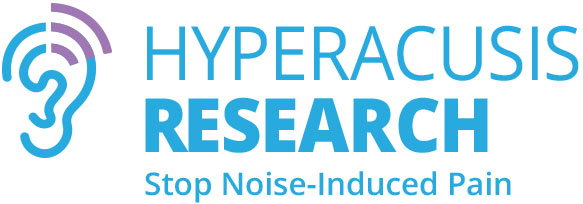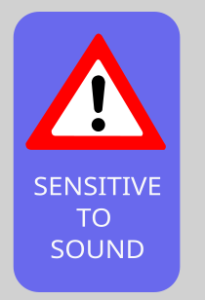By Stuart Colwill
Nine years ago, when I was a teacher, I started to notice that minor sounds (doors opening, pens tapping, keys jangling, birds chirping, coughing, sudden laughter) were becoming distressing, making me recoil and throwing me off track. My students wondered what on earth was wrong with me. I managed to keep working for about six months, but in the end I couldn’t deal with it any more and had to stop working for the sake of my sanity. It was the fire drills (piercing sirens) that were the final straw.
At home, I became unable to eat at table with my young family, because of the sharp sounds of cutlery making me spasm as if I had a bolt of electricity shooting through me. Anything like the wrinkling of tinfoil or opening of a crisp packet would send me running. I had to arrange to pick up my boys from school after all the other kids had left as I couldn’t cope with the playground noises.
At one point, my sensitivity became so bad that the sound of myself turning the page of a book as I read to my son in bed became uncomfortable. Just paper sliding across paper seemed to be a complex, multi-layered sound that slithered into my ear and then burrowed into my brain, saying ‘listen to ME!’ I used to call it ‘painful,’ but having read about pain hyperacusis, it’s not that. It’s more like incredible discomfort, with increased layers of sound precipitating something like a flight-or-fight response with a sense of panic, needing to get away from the sound asap.
I can’t really put my finger on anything that may have caused my condition. I had gone to a fair few gigs in my teens and early 20s, which made my ears ring for 24 hours or so. (I am now in my late 50s.) I currently do not have tinnitus.
I’ve always been more sensitive to intrusive noise than others. I shared a lot of flats in London in my 20s and 30s, and it was always me that noticed the noisy boiler, the squeaky door hinges or the buzzing fridge. My flatmates would say they heard it only because I’d mentioned it. But I was not remotely as sensitive to sound as I am now.
I was also diagnosed as having hyperacuity, i.e. general sensory overload, as I find it difficult to watch TV shows which have modern complex lighting arrays. I have to look away. Maybe they’re linked. The X-Factor, a music competition show, has loads of quick cuts, sudden applause and loud laughter. I often watch TV with subtitles. I’m always ready with the remote to turn the volume down, and tend to not watch TV with my family as they find it annoying when I keep doing that.
In addition to this, I seem to have something like APD, Auditory Processing Disorder. I never leave the house without at least earplugs in, as there are unexpected noises such as birds and lawnmowers, even though I’m lucky to live in a relatively quiet area. I always have my ear defenders in my hand or perched over my head ready to pull down over my ears.
There’s a local supermarket which is pretty horrific to visit (Muzak, clattering crates, beeping tills, alarms going off) but basically I have to go inside, so I wear double protection, dive in, breathe deeply and get out as soon as possible.
In the car I can cope without protection on an open road as the sound is more like white noise, but I’ll always have my defenders at the ready in case a siren or the like is approaching.
Other than that, I really don’t go out much. People say to me I should go for a walk in the country, but it’s impossible to avoid the crunching of chalk paths, birds overhead, farm machinery and light aeroplanes. I live near Brighton’s Shoreham Airport, and a lot of light aircraft fly over, and that’s one of the worst noises. They emit noise from both the engine and the propellers, and one frequency goes up while the other goes down. . . horrible.
I’m perfectly able to have a conversation with someone one-on-one when I’m facing them, as I know when they’re going to speak, so my system is ‘braced’ for their words or if they’re about to cough. But, say, when I’m walking the dogs (earplugs in and ear defenders on) and I bump into someone for a chat, I have to walk away a) if their dog is a random barker (man, that’s a sharp sound), or b) if someone else comes along and the conversations start overlapping — I can’t separate or focus on one voice in particular. It all merges together into one oppressive, indecipherable noise. Our dog, thankfully, is very quiet.
At home, we have silicone mats in the kitchen, tennis balls on the bottom of the chair legs to prevent scraping, rugs on the wooden floors and draught-proof tape ‘round door frames to block the sound. I’ve replaced a few interior door closing mechanisms with magnetic ones, which are way quieter.
When I’m watching football on TV and someone in the crowd starts drumming, I have to turn the sound off, as it’s discordant, unexpected and out of time with the commentary. I haven’t felt able to go to any kind of social event for a long time. But recently I wanted to go to a funeral that was important to me, so I thought I’d put up with the condition.
Again, I was chatting away to an old friend next to me in the church, then people behind started talking and I just had to shrug, give up and show him the ‘sensitive to sound’ sticker on my ear defenders. I put my head into the reception afterwards, but the cacophony of voices bouncing off the low ceiling and colliding in my brain became nothing short of nightmarish within a minute or so, so I had to leave.
Strangely enough, I can listen to music — not stuff like modern jazz or complex classical music with changing time signatures and the like, but music with a regular beat that I’m familiar with. I guess that my brain is not struggling to decode the sounds, as the sounds in a piece of music are generally harmonious and synchronised, unlike the random sounds of normal life.
Another aspect of my condition that seems to be uncommon is that the condition comes and goes, not from day to day but say, eight months on and four months off or thereabouts. The change is not like a switch, but rather a stuttering shift over two or three days. I really can’t think of anything that brings it on or makes it better. It seems to be random.
I’ve been refused any kind of benefits, as hyperacusis doesn’t fit into any kind of box as far as UK Social Security goes. Luckily, my wife works.
I’ve been through a thorough UK-NHS audiology process. When I finally found myself sitting in front of an audiologist at Royal Sussex Hospital, she had never come across hyperacusis in real life at all, and all the staff were wondering why I was flinching at the sound of heels tapping along the shiny floor. The hearing tests they gave me all came back normal.
Sticker on the side of Stuart’s earmuffs
I was given sound generators and pretty much told that’s all they could do. The sound generators were not much use. I use mynoise.net a lot for masking noises which helps. I use earplugs, ear defenders and noise cancelling headphones. I was told by a neurologist that it was not a neurological issue, but I’m pretty sure it is in my case. I’m a bit lost as to how to make things better. At least sometimes I get some respite for a few months. I do feel for those for whom this condition never stops.



Stuart –
Thank you for your bravery in telling your story. You did a fantastic job describing in such detail what everyday life is like with hyperacusis. For people who have never heard of the condition, they now have knowledge of the very real daily struggle. For those that struggle with you, they feel your experience close to their hearts as the similarities cross over. Thank you again for sharing your experiences.
Hi Stuart, It sounds like every takes courage. I have something different, auditory processing disability that makes it difficult for me to process sounds and conversation. With your condition, do conversations bother you?
Hello Stuart! Thank you for sharing your story. While reading, I understood perfectly every word and every pain you undergo through. At least you manage to live somehow. I hope one day I’ll be able too…
Hi everyone
I have hyperacusis and have not managed it well. I currently stay in my bedroom with double ear protection. If the sound is 40 db or less i can take off my ear protection. I’m moving later this summer to be close to family and have a 3 hour flight and a 4 hour drive. I’m scared to death the pain of being exposed this sounds will never end. Does anyone have experience traveling with pain? Thanks for your help